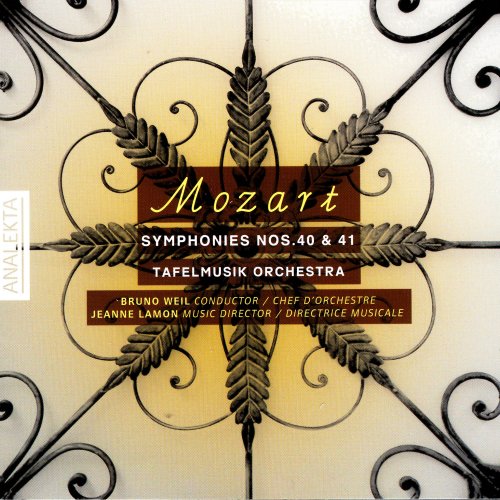
Jeanne Lamon, Tafelmusik Baroque Orchestra, Bruno Weil - Mozart: Symphonies Nos. 40 & 41 (2006)
BAND/ARTIST: Jeanne Lamon, Tafelmusik Baroque Orchestra, Bruno Weil
- Title: Mozart: Symphonies Nos. 40 & 41
- Year Of Release: 2006
- Label: Analekta
- Genre: Classical
- Quality: FLAC (tracks)
- Total Time: 01:08:00
- Total Size: 362 Mb
- WebSite: Album Preview
Tracklist:
1. Symphony No. 40 in G Minor, K.550: I. Molto allegro a 07:10
2. Symphony No. 40 in G Minor, K.550: II. Andante a 12:12
3. Symphony No. 40 in G Minor, K.550: III. Menuetto - Allegretto a 03:34
4. Symphony No. 40 in G Minor, K.550: IV. Allegro assai a 09:27
5. Symphony No. 41 in C Major, K.551 "Jupiter": I. Allegro vivace a 10:59
6. Symphony No. 41 in C Major, K.551 "Jupiter": II. Andante cantabile a 09:07
7. Symphony No. 41 in C Major, K.551 "Jupiter": III. Menuetto - Allegretto a 04:08
8. Symphony No. 41 in C Major, K.551 "Jupiter": IV. Molto allegro a 11:23
Performers:
Tafelmusik Baroque Orchestra
Bruno Weil
Jeanne Lamon
1. Symphony No. 40 in G Minor, K.550: I. Molto allegro a 07:10
2. Symphony No. 40 in G Minor, K.550: II. Andante a 12:12
3. Symphony No. 40 in G Minor, K.550: III. Menuetto - Allegretto a 03:34
4. Symphony No. 40 in G Minor, K.550: IV. Allegro assai a 09:27
5. Symphony No. 41 in C Major, K.551 "Jupiter": I. Allegro vivace a 10:59
6. Symphony No. 41 in C Major, K.551 "Jupiter": II. Andante cantabile a 09:07
7. Symphony No. 41 in C Major, K.551 "Jupiter": III. Menuetto - Allegretto a 04:08
8. Symphony No. 41 in C Major, K.551 "Jupiter": IV. Molto allegro a 11:23
Performers:
Tafelmusik Baroque Orchestra
Bruno Weil
Jeanne Lamon
In a remarkably short span of time during the summer of 1788, Wolfgang Amadeus Mozart (1756-1791) wrote what were to become his three last symphonies: Symphony No. 39 in E-flat major (K.543), Symphony No. 40 in G Minor (K.550) and Symphony No. 41 in C Major (K.551), the “Jupiter”. His incentive for writing them is unclear; it was unusual for Mozart to compose without the framework of a commission or specific occasion.
In early June, he writes to his friend and fellow Mason Michael Puchberg: “I dare to implore you to help me out with a hundred gulden until next week, when my concerts in the Casino are to begin. By that time I shall certainly have received my subscription money [from his new string quintets] and shall then be able quite easily to pay you back… I take the liberty of sending you two tickets which, as a brother, I beg you to accept without payment…”
The offer of tickets suggests forthcoming performances, perhaps of that summer’s symphonies and piano trios, but no further record of any concerts having taken place exists. So this may have been a rare instance of the composer writing purely on speculation. Mozart had often expressed the desire to travel to London, (as Haydn would do in the next decade), an occasion which would have required a trunk load of new works. If Mozart had lived to realize his own dream of a triumphant London journey, how fitting that he would have returned after a quarter century to the very place where as an eight-year-old he had produced his fledgling essays in the genre—in the style of his mentor Johann Christian Bach—with this trilogy of masterpieces, the quintessence of the eighteenth-century Viennese symphony.
In early June, he writes to his friend and fellow Mason Michael Puchberg: “I dare to implore you to help me out with a hundred gulden until next week, when my concerts in the Casino are to begin. By that time I shall certainly have received my subscription money [from his new string quintets] and shall then be able quite easily to pay you back… I take the liberty of sending you two tickets which, as a brother, I beg you to accept without payment…”
The offer of tickets suggests forthcoming performances, perhaps of that summer’s symphonies and piano trios, but no further record of any concerts having taken place exists. So this may have been a rare instance of the composer writing purely on speculation. Mozart had often expressed the desire to travel to London, (as Haydn would do in the next decade), an occasion which would have required a trunk load of new works. If Mozart had lived to realize his own dream of a triumphant London journey, how fitting that he would have returned after a quarter century to the very place where as an eight-year-old he had produced his fledgling essays in the genre—in the style of his mentor Johann Christian Bach—with this trilogy of masterpieces, the quintessence of the eighteenth-century Viennese symphony.
As a ISRA.CLOUD's PREMIUM member you will have the following benefits:
- Unlimited high speed downloads
- Download directly without waiting time
- Unlimited parallel downloads
- Support for download accelerators
- No advertising
- Resume broken downloads


